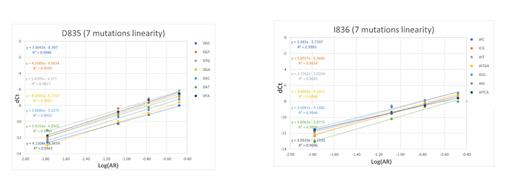Introduction
Acute myeloid leukemia (AML) is a heterogenous hematologic malignancy characterized by the rapid proliferation of abnormal myeloid cells in the bone marrow and blood. Fast and reliable diagnostic tests are imperative for the advancement of targeted therapies in the treatment of AML. FLT3 (FMS-like tyrosine kinase3) is one of the most frequent genetic alterations in AML and is present in approximately one-third of newly diagnosed patients. Considering the targeted therapies, such as midostaurin and gilteritinib available for FLT3 mutated AML, accurate and timely diagnosis of FLT3 mutations is vital for guiding treatment decisions and improving patient outcomes. The current diagnostic methods to detect FLT3-TKD mutations require a series of complex steps including blood sample handling, plate-based PCR, enzyme digestion and capillary electrophoresis or sequencing which can be time-consuming and labor-intensive. We have developed and evaluated the performance of a FLT3-TKD prototype using Cepheid's automated cartridge technology that demonstrates significantly less hands-on time and faster turnaround.
Objectives
We have developed a novel, fast and simplified qPCR-based FLT3-TKD prototype using Cepheid's GeneXpert® automated platform for detecting 14 mutations, including 7 mutations present in codon D835 and another 7 mutations in I836. The FLT3-TKD prototype is an easy-to-use sample in/result out assay with minimal hands-on time and time to results in less than 3 hours, and without the use of restriction enzymes or capillary electrophoresis. This assay is designed for quantitative detection of FLT3-TKD mutated DNA (D835 & I836) using ABL1 as an endogenous control in peripheral blood (PB) of AML patients. This assay utilizes the special chemistry, special design primers, and an optimized wild-type (WT) blocker to specifically detect SNPs and indels. With the combination of WT blocker and unique design of special design primers we were able to selectively amplify the rare mutations in the presence of abundant closely related WT fragments.
Results
Using this prototype, we were able to detect and quantify all 14 mutations (7 of D835 and 7 of I836) with an estimated LoD of AR 0.02 (Ratio of TKD mutation copies/ABL copies in PB background) in PB samples spiked-in with positive templates. ABL1 serves as a reference gene to normalize the WT DNA present in the background. Plasmid DNA with individual mutations was generated and spiked into the PB to assess the dynamic range of the test. We observed good alignment of dCt-AR (deltaCt-Allelic ratio) regression curve among all 14 mutations within the dynamic range tested (0.02-0.33). With pre-defined thresholds, our assay specificity has been above 95% among 20 screened EDTA donor blood samples. To further assess the sensitivity of this prototype, we also evaluated a CRISPR-CAS engineered cell line for the D835 G>A mutation. Using this cell line, we were successful in detecting the mutation down to AR of 0.008 in a PB background. For quantification analysis we prepared a linear panel of the most prevalent mutation D835(G>T) in the PB background and were able to quantify all mutations within the range of AR 0.008-to 0.83.
Conclusions
Here we describe the development and evaluation of an automated cartridge-based FLT3-TKD prototype that can detect 14 FLT3-TKD mutations. The cartridge prototype is preloaded with sample processing reagents and qPCR reagents with a turn-around time of less than 3 hours including offboard peripheral blood processing. When tested with contrived samples generated with either plasmid DNA or engineered cell lines spiked into blood, all 14 tested FLT3-TKD mutations were detected within a dynamic range of 0.02 to 0.33 AR with a specificity of > 95% in healthy donor whole blood background. With optimized primer and WT blocker design this prototype showed high sensitivity & specificity. We tested a broader dynamic range for the most prevalent mutation, D835 G>T, and were able to detect from AR of 0.008 to 0.83 AR. Additionally, since the prototype uses the GeneXpert® platform and current universal lysate sample prep procedure, the sample can potentially be used across all Cepheid Hematology Oncology products. This prototype significantly reduces the hands-on time with future potential to provide clinicians with fast and accurate detection of FLT3 mutation status that can aid prognostic evaluation and treatment in AML patients.
Disclosures
Kushal:Cepheid: Current Employment. Calayag:Cepheid: Current Employment. Das:Cepheid: Current Employment. Saatian:Cepheid: Current Employment. Xie:Cepheid: Ended employment in the past 24 months. Bates:Cepheid: Current Employment.


This feature is available to Subscribers Only
Sign In or Create an Account Close Modal